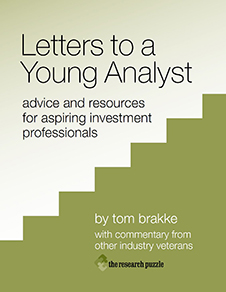
- Thursday, January 29th, 2009
- pharmaceutical alpha
-
OK, we’ve tried just about everything else. How about adding value through pharmaceuticals?
No, we aren’t anticipating the start of the baseball season with questions about whether our heroes will have figured out a way to beat the tests and still bulk up. Nor are we contemplating investing in pharmaceutical stocks, although doing so over the last eighteen months would have produced that least favorite kind of alpha — relative outperformance in a bad market.
Instead, we are left to wonder whether there are some drugs that we can take to help us make better investment decisions. Certainly investment people are like other members of the population, with some percentage prone to using illegal drugs, and the relative income has been there to support the habit of those that indulged.New York Times | This summary of a longer Floyd Norris piece details the extraordinary growth in compensation for financial workers (relative to others) over the last generation. There are those that party after a grueling market day, whether through exultation or to forget,Twenty years ago, there was someone from the leading brokerage firm who would visit the stairwell of the skyscraper where I worked to have a toke (or more) just after the market closed. and those that take something that they think will give them the edge while they are “on the job.”
In fact, doing so is quite common. A Nature article from April detailed the extent to which its readers (at least according to a survey of them, mainly doctors, scientists, grad students, and the like) use Ritalin and beta blockers, among other things, to improve their intellectual performance.Wired Science | This short summary is worth looking at if only for the comments. In it, Dr. Barbara Sahakian of Cambridge University stated, “The desire for cognitive enhancement is very strong, maybe stronger than for beauty or athletic ability.” Given that, pills that promise enlightenment will be coming to a conference room or trading desk near you soon, if they haven’t already.
And so what are we to do? A recent Neuronarrative postingNeuronarrative | This includes a link to the April article cited above, the new one (hurry, like drugs the link only lasts for awhile), and a piece from Time that shows that the topic is getting mainstream play. summarizes yet another Nature piece; this one calls for legalization of substances that help us think. So, maybe we should invest in firms that develop compounds designed to meet our specific needs. Perhaps there could be a “hyper” version for those that attempt to keep pace with the algorithmic trading of today and a “slow” one for those just trying to discern sustainable competitive advantage into the future.
Until then, we should remember that there may be those who are self-medicating and that the side effects they experience may become impediments to the work of others and the process as a whole. If they occasionally hit one out of the park we may be tempted to look the other way, but we don’t really know if they’ll end up in the Hall of Fame or washed up and forgotten.
